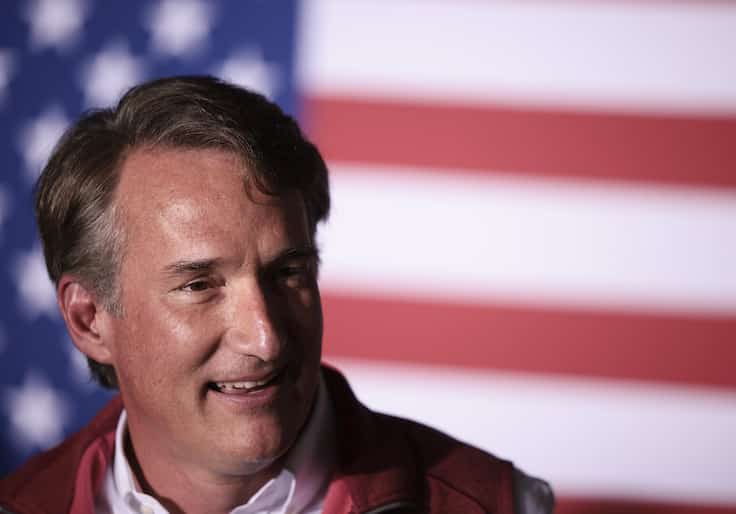Consensus forms quickly. Within hours of winning the Virginia governor’s race, Glenn Youngkin was identified as a model for GOP candidates. The argument ran as follows: The former businessman and political newbie figured out how to hold Donald Trump’s hand—as one Republican senator put it, under the table and in the dark—and still win big in a blue state. He ran on kitchen-table issues: rising prices, schools, crime. He tailored his message to his locality and avoided national debates. None of his television advertisements featured President Biden and none mentioned illegal immigration. He defined himself as a basketball-playing, dog-loving dad from the suburbs before his opponent was able to portray him as Trump in fleece. He built coalitions with parents, veterans, and minority groups. Republicans who follow his path might enjoy similar success in 2022 and beyond.
In truth, Youngkin might not be as replicable as he appears. The reason is candidate quality. For a political rookie, Youngkin has mad skills. He has a preternatural ability to stay on message. He is positive and optimistic without coming across as treacly or sentimental. I have yet to see him frown. He has what Reagan adviser John Sears called “negative ability”—the power to deflect, repel, and ignore personal attacks. Nothing seems to get under his skin. Politicians who have this quality drive the opposition nuts. You could sense the Democrats’ frustration when Biden told a Virginia audience that extremism can come “in a smile and a fleece vest.” Maybe that’s right, but the average Virginian doesn’t look at Glenn Youngkin and see a neo-Nazi or a Proud Boy. The average Virginian sees an approachable and energetic father of four with commonsensical plans to improve the quality of life in his home state. That’s the type of profile any candidate, Republican or Democrat, ought to aim for. But it’s easier said than done.
Both his opponent and the national environment helped Youngkin. Terry McAuliffe learned how difficult it is to win nonconsecutive terms—something that may be of interest to the ruler of Mar-a-Lago. And McAuliffe clearly believed that demographics are destiny and that Virginia was irrevocably blue. He ran on airy evocations of a pleasant past and fiery denunciations of Youngkin as a Trump-like threat to institutional stability and social peace. McAuliffe’s inability to find a galvanizing issue led him to run an idea-free campaign based on mobilizing Democratic interest groups. His accusations of racism and nuttery turned out many Democrats to the polls. Just not enough to win.
The general deterioration of Biden’s presidency hurt McAuliffe. The inflation, incompetence, and cultural radicalism dragging down Biden’s job approval rating are taking other Democrats with him. The red shift in Virginia, New Jersey, and elsewhere on election night hints at bad things to come for the incumbent party. Republican leader Kevin McCarthy speculates that another 2010, when the GOP picked up 63 House seats, may be in the making. For that to happen, McCarthy has to find plenty of candidates who aspire to be Glenn Youngkin, match them against clueless incumbents, and pray that Biden’s approval rating next November is the same as or lower than it is today. This is a possible scenario, and perhaps even the most likely one. But this is also the Republican Party we are talking about. Things can always end in disaster.
It’s less as a candidate than as a governor that Youngkin can be a model for the Republican Party. He’s been given the opportunity to govern, and to govern well. His coattails brought in a Republican lieutenant governor, a Republican state attorney general, and a Republican House of Delegates. The Democrats control the state senate by two seats—but this narrow margin is pliable and open to compromise. Youngkin is in a unique position. He’s the first high-profile Republican chief executive elected in the Biden era. He has the chance to demonstrate that Republicans can address parental revolt, public safety, and economic insecurity in responsible and effective ways. He has the chance to define that agenda in the coming year, and even to broaden it, so that Republicans in 2022 have an example to point to and a lodestar to follow.
This agenda starts with education. Parents became the centerpiece of Youngkin’s campaign, the lynchpin of his victory, after McAuliffe’s career-ending gaffe of September 28, when the former governor said that parents shouldn’t be telling teachers what to teach. In a post-election interview with Hugh Hewitt, Youngkin mentioned charter schools, high curricular standards, and more spending on teachers and on special education. On the trail he pledged to ban “Critical Race Theory,” or “CRT,” from public school instruction—though he has to find a way to do so without revising or omitting the history of slavery, segregation, and the civil rights movement. My American Enterprise Institute colleagues Brad Wilcox and Max Eden suggest that Youngkin promote “academic transparency” by requiring parental review and opt-in for hot-button curricula, prioritize educational savings accounts, and align school-board elections with the national political cycle.
Youngkin also has said that he will place public safety officers in schools. This initiative should become the basis for a more wide-ranging effort to bolster state and local police forces, with an eye toward community policing and the reassuring presence of cops on the beat. Youngkin’s “game plan” includes firing the state parole board to discourage early release of violent offenders. He wants to reform the state mental health system. He might also want to combat drug trafficking and opioid abuse—with the understanding that it is better to do several things well than many things poorly.
As Henry Olsen observed in October, Youngkin’s economic agenda fits well with the emerging Republican coalition of non-college-educated voters. Rather than cut marginal tax rates, Youngkin would double the state standard deduction, eliminate the grocery tax, and suspend the gas tax, easing the burden on lower- and middle-income taxpayers suffering from a rising cost of living. He says he’d like to encourage innovation and job creation throughout the state. One way might be to take the lead in “strategic decoupling” from China and incentivize manufacturers of critically important goods to reshore facilities in the commonwealth. Over a decade ago, I accompanied then-senator George Allen (R.) on a tour of a Virginia-based semiconductor plant. Let’s make room for more of them.
The danger for the governor-elect is that he will entangle himself in national debates over vaccine and mask mandates. I expect the next state attorney general to join the legal challenges to President Biden’s vaccine mandate on private-sector employers, and I wouldn’t be surprised if the incoming state government attempts to end public school masking requirements. In general, however, Youngkin ought to be wary of intruding on local control and private-sector decision-making, even if it might win him fans among certain parts of the right. It ought to be remembered that Youngkin’s populism was actually popular and commonsensical—unlike some of the anti-elitism and suspicion of expert opinion that one encounters in politics these days.
It would be a missed opportunity if the governor-elect frittered away his resounding victory on cultural squabbles that generate headlines and score likes but do not improve life for Virginians in the real, not virtual, world. Still, I have a feeling—maybe it’s just a hope—that Youngkin will be a serious governor in demanding times who shows his fellow Republicans not just how to win, but how to govern. All with a smile and a fleece.






